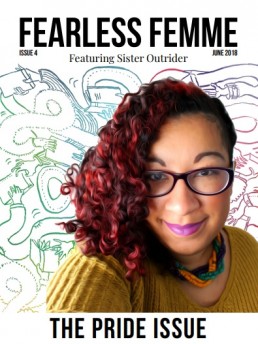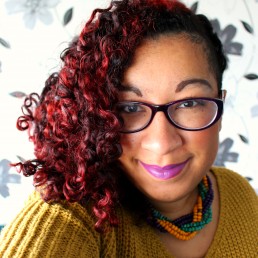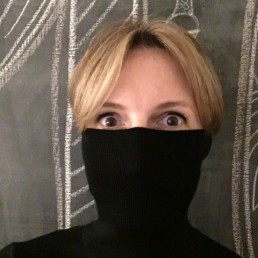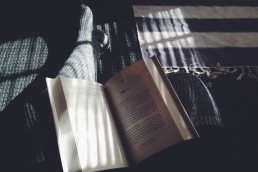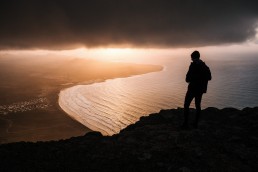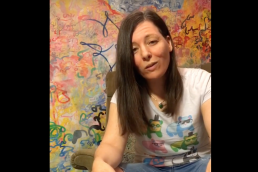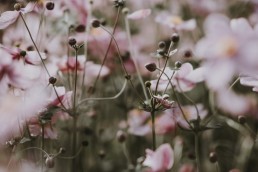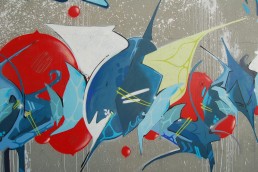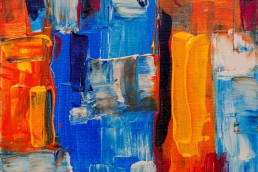Image credit: Ricardo Gomez Angel, via Unsplash
Fearless Femme’s Managing Editor Heather Pearson had some questions for Claire Heuchan (AKA award winning blogger ‘Sister Outrider‘) about mental health, influences and lesbian identity. With her answers, Claire went to places many folk don’t – right to the heart of honesty and rich reflection, with a great deal of care for those in the Fearless Femme community at difficult points with their own identity forming. Grab a cuppa, get comfy and enjoy wisdom from the cover woman of our fourth digital magazine, in which all content is themed around Pride and LGBTQIA+ identities. Learning lies here…
Q. We’ve been talking on and off in the office about how some days we feel fearless, while other days fearfulness feels more present. Can you tell us about a fear you previously had which has now gone and about how you think of fear generally, is it something that motivates you or something you work with to inform your growth?
A. Fear isn’t something I find motivational – quite the opposite. It locks me into spirals of anxiety, which makes sense because anxiety is basically having a fight or flight response triggered by things that aren’t necessarily threats even though we process them as threats. When I feel fear, it’s usually that kind of animal panic. It’s like everything in me that’s creative and connected to the world closes up. Fear makes me fold in on myself.
As a child I was often desperately afraid to go to school, for a mixture of reasons. One of those reasons was racism. I didn’t have the language to name it back then, but school was the source of so much racial trauma. I can count how many other people of colour there were in primary and secondary without using all my fingers. I can vividly remember that feeling of dread lining the pit of my stomach that came when I was Othered, or another child would use racial slurs. Even when there wasn’t racism, there was always the possibility of it. And nobody ever faced consequences for it, so there was really nothing to stop kids from weaponising racism. There were no teachers of colour, so the adults responsible for my wellbeing mostly looked the other way because they didn’t know how to deal with racism or thought the kindest thing they could do was just pretend I was white.
At a workshop Scottish Women’s Aid ran, they used a balloon to show how domestic terrorism worked. The facilitator said she was going to burst it, but not when. She squeezed the balloon, pressed it tight, but still it didn’t burst. She pressed the balloon against sharp edges. All of us were sat on the edge of our seats, waiting for the balloon to pop. We were constantly on guard, bracing ourselves for the explosion. The room went silent, filled with this awful tension. In the end, she didn’t even burst the balloon. But she could have at any point. That reminded me a lot of how it felt to grow up Black in an environment where the vast majority of other people were white.
I began to be very afraid of being trapped in circumstances I couldn’t assert control over, because of how I experienced racism in school. And I only started to overcome that fear when I did my MLitt in Gender Studies. It was a really big thing for me to be able to connect with a learning environment and engage with it on my own terms. As a child you don’t have much control, but now as an adult I have the power to come and go as I please. Nothing is mandatory. Nobody has authority over me. So that particular fear is gone.
Q. If you feel comfortable, can you tell us about any mental health challenges you face at the moment and how your work has helped or hindered your mental health? Also, if at all, how much do you separate your mental health from the rest of your identity when discussing who or how you are?
A. Sure. I have depression and anxiety, which I try to be open about. Quite a few of the problems attached to having mental illness are a result of the stigma attached to it, or the shame that’s projected onto being anything other than what society considers well. And the vision of wellness we’re offered by mainstream society has less to do with wellbeing and more to do with our capacity for making money.
I used to be afraid of my life falling apart, or never getting properly started with adulthood, because of mental illness. It was an intense worry, because I’m depressed and not always functional – which is a problem for pretty much any job with set hours. Fortunately, since I started to write freelance, I’ve worked far more consistently than ever before. There’s joy and fulfilment in the work, both of which are good for my mental health, and even if being freelance isn’t always secure, it is the most sustainable way of living and working I’ve found yet.
I can’t really separate my mental health from any other aspect of my life. It’s part of me. There’s this idea of the Strong Black Woman, which means people project a kind of supernatural strength onto Black women to explain to themselves how we cope with the hardship of being racialised and gendered and whatever else simultaneously. A lot of people buy into the image of Strong Black Women, but it’s a dehumanising stereotype and closes off the space for Black women to be open about our struggles.
It’s also a part of what shapes my perspective when I write. I don’t think I’d be able to write like I do now, or have the same level of insight, if my mind hadn’t travelled to difficult places – and those journeys were often a product of mental illness. If there is a silver lining, it’s that I have the capacity to sit with things that aren’t straightforward or don’t have easy answers. That helps in my practice of feminist politics, because critical self-reflection is a crucial part of growth. It’s how we unlearn the ways we’re complicit in any hierarchy and replace them with conscious resistance. When writing my feminist essays, I think of myself as a depressed feminist as much as a Black or lesbian one – it all shapes me.
Q. Self-care is a mental health buzz-phrase right now, as you know. Depending on who we’ve spoken to, self-care refers to everything from having a pick-me-up ‘treat’ bar of chocolate when feeling tired, to visiting a psychiatrist or taking recovery time off work or classes. What, if anything, does self-care mean to you?
A. First and foremost, self-care is about doing what’s necessary for my health – whether it’s mental or physical, though both are connected. Self-care is the bridge that takes me from struggling to survive to a place where I might even start to thrive. And at this point in my life it can’t be that expensive, because then what I’m doing to relieve stress would just cause anxiety over money.
Self-care is taking a day out when I need it, and booking back into therapy when those days start to become frequent. Self-care is bubble bath, a book, and a lavender candle. Self-care is my Sunday afternoon routine of listening to Amy Lamé’s show on Radio 6 and baking some treats for the upcoming week. Self-care is getting regular exercise, because writing involves a lot of sitting around and if I stop moving enough then my brain stagnates and my back aches. Self-care is going to a crochet class whenever possible so that I don’t get isolated – writing and working from home can both be very solitary, so it’s good to keep a habit of going somewhere and sharing in a social activity. Self-care is going to the library every couple of weeks to pick up some new books and return the old ones.
The things I’m conscious of being acts of self-care are often the things that make me feel most comfortable in myself. I can be engaged in them without the need for a distraction to take me out of myself. The more regularly I’ve practiced self-care, the less I’ve turned to the things I think of as filler – designed to numb and kill time. No more wasting evenings on Candy Crush.
Q. Can you tell us about the different stages you went through in discovering and publically owning your identity – did the two happen in sync or did one follow the other? What was your biggest challenge? What, if anything, have you received most kickback about?
A. I think I had to get to grips with being a lesbian, to properly understand how it worked and how I felt about it, long before feeling comfortable going public. Subconsciously, I always knew I liked women. Seeing Uma Thurman as Poison Ivy in the old Batman film, wearing that magnificent green catsuit – that was a pivotal moment. I was five, and she enchanted me. For years I fantasised about running away to Gotham and forming a girl gang with her. Finding out that Uma Thurman’s hair wasn’t really long and red was a crushing disappointment. Then there was Captain Janeway. If I was really lucky, I’d be allowed to eat dinner in front of the TV so I didn’t miss Star Trek: Voyager. I was a little older then, but understood I had to grow up before I could run away and have space adventures with her.
This carried on until Orange is the New Black first aired, and I thought it would be worth being in prison to be surrounded by women and have a girlfriend. And then it clicked: I didn’t have to be in prison to be with women and not men. Thinking about why I wanted that, it became clear why my sad attempts at heterosexuality had been so dismal. At twenty, I realised I was a lesbian and never looked back. It was a few months before I felt ready to be ‘out’, which was really nerve-wracking at first but so, so worth it in the end. And then it took a couple of years before I was interested in being outspoken about it, for example claiming lesbian feminism.
One thing I’ve noticed as that whatever issue you’re being vocal about will determine the kind of backlash you receive. If you write about race, you become a lightning rod for racism. If you write about misogyny, you will get a deluge of sexism. And so on. Overall, I tend to get more abuse online for being Black than lesbian – maybe because my race is immediately visible.
Q. Who are your favourite LGBT artists and writers?
A. There are so many to choose from. Since it came out, I’ve been hooked on Janelle Monáe’s new album: Dirty Computer. She looks damn fine in a suit, too. I’m also a huge fan of Janelle’s mentor, Prince. His music brightens up even my lowest days. And Hayley Kiyoko is everything – I love driving the car and blasting her music, because those are quality sapphic beats. In terms of books, I really like the Nigerian writer Chinelo Okparanta. She’s written a stunning novel, Under the Udala Trees, about lesbian life and all the barriers to it. Her short stories are pretty magical too. There’s also Kirsty Logan, who writes beautiful novels where magic and reality are blurred and women fall in love. And the most obvious answer is Audre Lorde. I live for her words. As a novelist, a poet, a feminist theorist, her writing is so nourishing.
Q. We know you’re a prolific reader and we’ve loved following your book choices on Twitter. Do you remember which book first filled you with that joy of suddenly knowing yourself or something about life that had hitherto completely confused you?
A. There have been a few. Looking back, it’s quite a nice feeling to measure my life in books. I found joy and affirmation in all of Jackie Kay’s writing, especially her memoir “Red Dust Road”, because she manages to articulate what it means to be Black and Scottish – and lesbian on top of that.
Also, at about eleven, I read Malorie Blackman’s Noughts and Crosses. Black people, Crosses, hold most of the social, political, and economic power because historically they’ve exploited Noughts, white people. Seeing the power dynamic of race completely flipped like that made me really think for the first time about how deeply rooted racism is in society. It shapes everybody’s sense of self, whether they’re oppressed or oppressor, whether or not they’re even conscious of it. And those stories gave me the space to work out that racism wasn’t just a series of painful isolated incidents – that it wasn’t a coincidence, but a result of how society has been engineered.
Malorie Blackman was also the first Black author I knowingly read. Our school library was very white, and the local library too at the time. Finding a Black woman who wrote these mind-blowing stories was significant, because until then I’d only seen white people as authors and not thought of writing as something Black people did. She challenged my subconscious assumptions about who could be a writer, and whose voices were worth listening to.
Q. This month, our issue is themed around LGBTQ+ Pride. What does pride mean to you?
A. Pride is the opposite of shame. Instead of feeling embarrassed or uncomfortable about having an LGBTQ+ identity, pride is being comfortable with that part of yourself and embracing how it shapes the whole of who you are as a human being. And while it’s important to come together as a group, and organise collectively for political purposes, I think Pride has to start from within. Not everybody is safe to come out or in a position to be vocal about being LGBT – holding that seed of pride within yourself when you can’t nurture it outwardly is a kind of resistance.
The word Pride has come to be associated with the march, which in recent years has taken on a lot of corporate sponsorship and failed to engage with what LGBT people of colour have to say about the poor race politics of those spaces. Parts of it have become more performative than political as white gay men have approached equality with white straight men, which is a shame. Everyone with less social power gets left behind. Organisations like Free Pride and Black Pride UK are doing interesting things, bringing celebration and resistance together.
Q. Being “closeted” can really have a negative effect on mental health. What are the best words of advice you wish you could give to a young woman struggling to come out?
Firstly, do what’s safe for you. Don’t feel like you have to come out if it will put you at risk in any way. Being out doesn’t validate your sexuality – though there is a kind of affirmation in being seen, who you are doesn’t change as a result of how other people see you.
And if you are in a position to come out, make sure it’s with people you trust – especially for the first few times. If it’s something you’re not ready to become totally public knowledge, tell someone you’re confident won’t spread it around. I found it easier to tell people individually rather than in groups. Coming out can be terrifying in the beginning, especially with close family. That’s probably the biggest hurdle. But, over time, the more you do it the less scary it becomes.
I also think that the older you get, the more control you have over your life. When you’re young, you don’t have the same autonomy that comes with being an adult. And that makes a difference. The freedom of being grown, in a position where even if people don’t like this part of your life they do not have the same authority to challenge or restrict what you’re doing – that helps too.
You will get to where you need to be. And even if that point feels far away, it absolutely will come with time.
Claire Heuchan
Claire Heuchan is a Black radical feminist from Scotland, and author of award winning blog Sister Outrider. In addition to winning the Best Blog category for the 2016 Write to End Violence Against Women Awards and being shortlisted for the Emma Humphreys Memorial Prize, Sister Outrider is accessed around the world and has been translated into French, Spanish, Portuguese, German, and Dutch.
Claire achieved an MLitt in Gender Studies at the University of Stirling, which informs her theorising alongside 25 years of experience inhabiting this world in a body that is Black and female. Claire has essays featured in a growing range of books, and is a volunteer at the Glasgow Women’s Library.
Heather Pearson
Heather Pearson is based in Edinburgh and, through poems, prose and commentary, tells stories about womanhood, place, identity and change.

